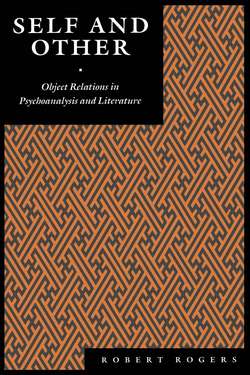Читать книгу Self and Other - Robert Rogers L. - Страница 9
На сайте Литреса книга снята с продажи.
FOREWORD
ОглавлениеThe Psychoanalytic Crosscurrents series presents selected books and monographs that reveal the growing intellectual ferment within and across the boundaries of psychoanalysis.
Freud’s theories and grand-scale speculative leaps have been found warning, if not disturbing, from the very beginning and have led to a succession of derisive attacks, shifts in emphasis, revisions, modifications, and extensions. Despite the chronic and, at times, fierce debate that has characterized psychoanalysis, not only as a movement but also as a science, Freud’s genius and transformational impact on the twentieth century have never been seriously questioned. Recent psychoanalytic thought has been subjected to dramatic reassessments under the sway of contemporary currents in the history of ideas, philosophy of science, epistemol-ogy, structuralism, critical theory, semantics, and semiology as well as in sociobiology, ethology, and neurocognitive science. Not only is Freud’s place in intellectual history being meticulously scrutinized, but his texts, too, are being carefully read, explicated, and debated within a variety of conceptual frameworks and sociopolitical contexts.
The legacy of Freud is perhaps most notably evident within the narrow confines of psychoanalysis itself, the “impossible profession” that has served as the central platform for the promulgation of official orthodoxy. But Freud’s contributions—his original radical thrust—reach far beyond the parochial concerns of the clinician psychoanalyst as clinician. His writings touch on a wealth of issues, crossing traditional boundaries—be they situated in the biological, social, or humanistic spheres—that have profoundly altered our conception of the individual and society.
A rich and flowering literature, falling under the rubric of “applied psychoanalysis,” came into being, reached its zenith many decades ago, and then almost vanished. Early contributors to this literature, in addition to Freud himself, came from a wide range of backgrounds both within and outside the medical/psychiatric field, and many later became psychoanalysts themselves. These early efforts were characteristically reductionist in their attempt to extrapolate from psychoanalytic theory (often the purely clinical theory) to explanation of phenomena lying at some distance from the clinical. Over the years, academic psychologists, educators, anthropologists, sociologists, political scientists, philosophers, jurists, literary critics, art historians, artists, and writers, among others (with or without formal psychoanalytic training), have joined in the proliferation of this literature.
The intent of the Psychoanalytic Crosscurrents series is to apply psychoanalytic ideas to topics that may lie beyond the narrowly clinical, but its essential conception and scope are quite different. The present series eschews the reductionist tendency to be found in much traditional “applied psychoanalysis.” It acknowledges not only the complexity of psychological phenomena but also the way in which they are embedded in social and scientific contexts that are constandy changing. It calls for a dialectical relationship to earlier theoretical views and conceptions rather than a mechanical repetition of Freud’s dated thoughts. The series affirms the fact that contributions to and about psychoanalysis have come from many directions. It is designed as a forum for the multidisciplinary studies that intersect with psychoanalytic thought but without the requirement that psychoanalysis necessarily be the starting point or, indeed, the center focus. The criteria for inclusion in the series are that the work be signifl-candy informed by psychoanalytic thought or that it be aimed at furthering our understanding of psychoanalysis in its broadest meaning as theory, practice, and sociocultural phenomenon; that it be of current topical interest and that it provide the critical reader with contemporary insights; and, above all, that it be high-quality scholarship, free of absolute dogma, banalization, and empty jargon. The author’s professional identity and particular theoretical orientation matter only to the extent that such facts may serve to frame the work for the reader, alerting him or her to inevitable biases of the author.
The Psychoanalytic Crosscurrents series presents an array of works from the multidisciplinary domain in an attempt to capture the ferment of scholarly activities at the core as well as at the boundaries of psychoanalysis. The books and monographs are from a variety of sources: authors will be psychoanalysts—traditional, neo- and post-Freudian, existential, object relational, Kohutian, Lacanian, etc.—social scientists with quantitative or qualitative orientations to psychoanalytic data, and scholars from the vast diversity of approaches and interests that make up the humanities. The series entertains works on critical comparisons of psychoanalytic theories and concepts as well as philosophical examinations of fundamental assumptions and epistemic claims that furnish the base for psychoanalytic hypotheses. It includes studies of psychoanalysis as literature (discourse and narrative theory) as well as the application of psychoanalytic concepts to literary criticism. It will serve as an outlet for psychoanalytic studies of creativity and the arts. Works in the cognitive and the neuros-ciences will be included to the extent that they address some fundamental psychoanalytic tenet, such as the role of dreaming and other forms of unconscious mental processes.
It should be obvious that an exhaustive enumeration of the types of works that might fit into the Psychoanalytic Crosscurrents series is poindess. The studies comprise a lively and growing literature as a unique domain; books of this sort are frequently difficult to classify or catalog. Suffice it to say that the overriding aim of the editor of this series is to serve as a conduit for the identification of the outstanding yield of that emergent literature and to foster its further unhampered growth.
Leo Goldberger
Professor of Psychology New York University
